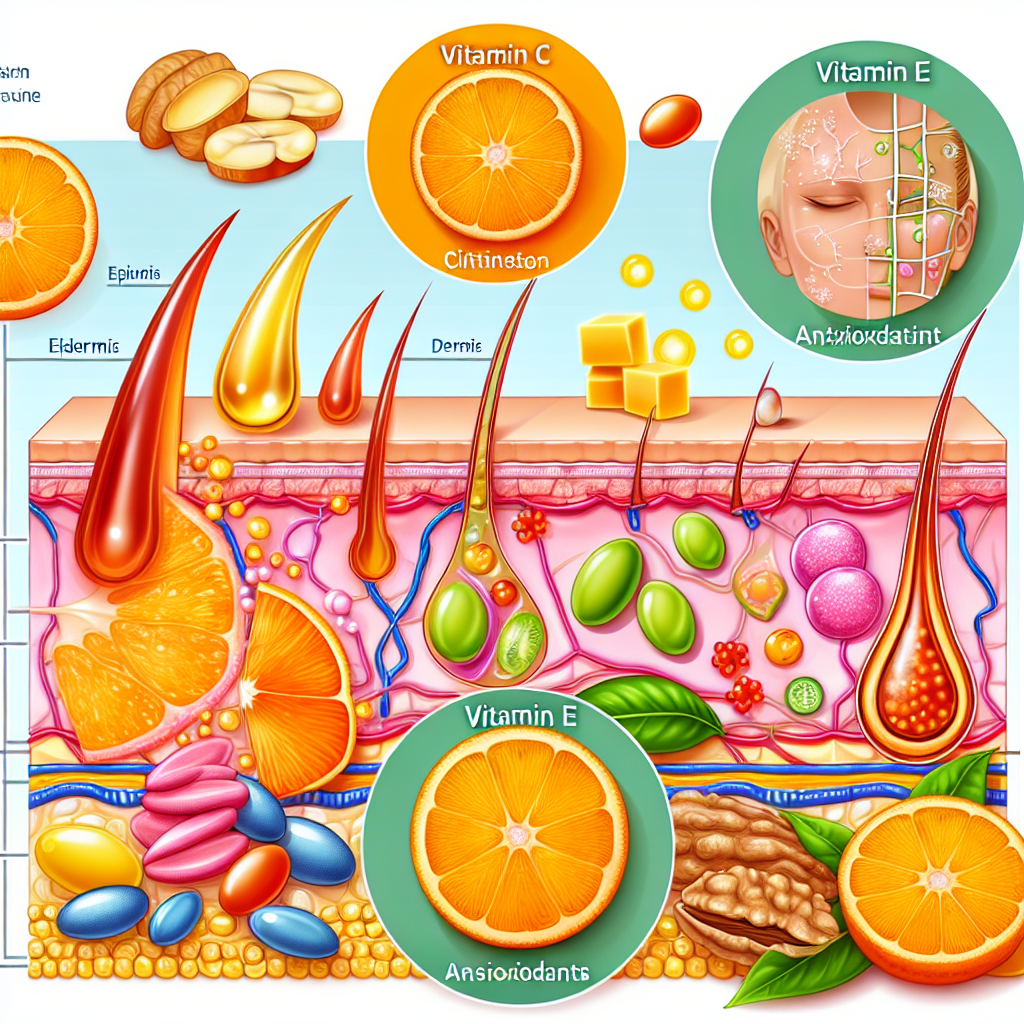How Vitamin C and E Keep Your Skin Glowing

Discover how Vitamins C and E can keep your skin glowing! Learn more about their benefits and how to incorporate them into your skincare routine. Don’t wait, start your journey to healthier, radiant skin today. Click here to find out more.
The Role of Vitamin C and E in Achieving Radiant Skin
The quest for radiant, glowing skin is a journey that many embark on, but few truly understand the science behind achieving this coveted glow. The secret to radiant skin lies not only in the products we apply topically but also in the nutrients we consume. Among these nutrients, vitamins C and E play a pivotal role in maintaining and enhancing the health and glow of our skin.
Vitamin C, also known as ascorbic acid, is a potent antioxidant that is crucial for the health of our skin. It is water-soluble and found in various fruits and vegetables, including oranges, strawberries, kiwi, and bell peppers. This vitamin plays a significant role in collagen synthesis, a process that helps maintain the skin’s elasticity and firmness. As we age, our skin’s collagen production naturally decreases, leading to wrinkles and sagging skin. By boosting collagen production, vitamin C helps to counteract these signs of aging, promoting a youthful and radiant complexion.
Moreover, vitamin C is renowned for its ability to brighten the skin and reduce hyperpigmentation. It inhibits the enzyme tyrosinase, which is responsible for converting tyrosine into melanin, the pigment that gives our skin its color. By inhibiting this enzyme, vitamin C helps to prevent the formation of excess melanin, thereby reducing dark spots and uneven skin tone. This results in a brighter, more even complexion that exudes a natural glow.
On the other hand, vitamin E, a fat-soluble vitamin found in nuts, seeds, and leafy greens, works synergistically with vitamin C to enhance its effects. Like vitamin C, vitamin E is a powerful antioxidant that helps protect the skin from damage caused by free radicals. These unstable molecules can damage the skin’s cells, leading to premature aging and dullness. By neutralizing these free radicals, vitamin E helps to maintain the health and vitality of the skin.
In addition to its antioxidant properties, vitamin E also has moisturizing benefits. It helps to strengthen the skin’s barrier function, preventing moisture loss and keeping the skin hydrated. Hydrated skin is plump, smooth, and radiant, so by maintaining the skin’s moisture levels, vitamin E contributes to a healthy, glowing complexion.
Furthermore, when used together, vitamins C and E have a complementary effect. Vitamin C helps to regenerate vitamin E, enhancing its antioxidant properties and increasing its effectiveness. This synergistic effect makes these two vitamins a powerful duo in the pursuit of radiant skin.
In conclusion, vitamins C and E play a crucial role in achieving and maintaining radiant skin. They boost collagen production, reduce hyperpigmentation, protect against free radical damage, and maintain the skin’s hydration levels. By incorporating these vitamins into your diet and skincare routine, you can enhance the health and glow of your skin. However, it’s important to remember that while these vitamins are beneficial, they are not a substitute for a balanced diet, adequate hydration, and sun protection. Achieving radiant skin is a holistic process that involves taking care of your skin both inside and out.
Unlocking the Secrets of Glowing Skin: The Power of Vitamins C and E

Unlocking the secrets of glowing skin is a quest that has been pursued by many for centuries. In the modern era, the search for the proverbial fountain of youth has led to the discovery of the powerful role that vitamins play in maintaining skin health. Among these, vitamins C and E have emerged as potent allies in the fight against skin aging and damage, helping to keep your skin glowing and youthful.
Vitamin C, also known as ascorbic acid, is a water-soluble vitamin that is essential for the synthesis of collagen, a protein that provides structure and elasticity to the skin. As we age, the production of collagen in our bodies decreases, leading to the formation of wrinkles and fine lines. By boosting collagen production, vitamin C helps to maintain the skin’s firmness and elasticity, thereby reducing the appearance of these aging signs. Moreover, vitamin C is a powerful antioxidant that protects the skin from the damaging effects of free radicals, unstable molecules that can cause oxidative stress and accelerate the aging process. By neutralizing these harmful molecules, vitamin C helps to prevent skin damage and maintain its youthful glow.
In addition to its role in collagen synthesis and antioxidant protection, vitamin C also plays a crucial role in skin brightening. It inhibits the enzyme tyrosinase, which is responsible for the production of melanin, the pigment that gives color to our skin. By reducing melanin production, vitamin C helps to lighten hyperpigmentation and dark spots, resulting in a more even and radiant skin tone.
On the other hand, vitamin E, also known as tocopherol, is a fat-soluble vitamin that is renowned for its potent antioxidant properties. Like vitamin C, it protects the skin from the damaging effects of free radicals. However, its fat-solubility allows it to be stored in the sebaceous glands and released onto the skin’s surface through sebum, providing long-lasting protection against oxidative stress. This makes vitamin E particularly beneficial for dry and mature skin, as it helps to maintain the skin’s moisture barrier and prevent transepidermal water loss, keeping the skin hydrated and plump.
Furthermore, vitamin E has anti-inflammatory properties that help to soothe and calm irritated skin. It also aids in the healing process of the skin, making it beneficial for those with acne, eczema, or other skin conditions. Moreover, when combined with vitamin C, vitamin E enhances the photoprotective effects of sunscreen, providing additional protection against the harmful effects of UV radiation.
In conclusion, vitamins C and E are powerful allies in the quest for glowing skin. They work synergistically to boost collagen production, protect against oxidative stress, brighten the skin, and maintain its hydration and elasticity. By incorporating these vitamins into your skincare routine, either through topical application or dietary intake, you can unlock the secrets of glowing skin and maintain its youthful radiance. However, it’s important to remember that while these vitamins can significantly improve skin health, they are not a substitute for a balanced diet, adequate hydration, regular exercise, and good sleep, which are all essential for overall health and well-being.
How Vitamins C and E Contribute to a Healthy, Glowing Complexion
Vitamin C and E are two essential nutrients that play a significant role in maintaining a healthy, glowing complexion. These vitamins are potent antioxidants that protect the skin from harmful free radicals, promote collagen production, and aid in skin repair and regeneration.
Vitamin C, also known as ascorbic acid, is a water-soluble vitamin that is crucial for the synthesis of collagen, a protein that provides structure and elasticity to the skin. As we age, our skin’s natural collagen production decreases, leading to the formation of wrinkles and fine lines. By boosting collagen production, vitamin C helps to maintain the skin’s firmness and elasticity, thereby reducing the appearance of these aging signs.
Moreover, vitamin C is a powerful antioxidant that protects the skin from the damaging effects of free radicals. Free radicals are unstable molecules that can cause oxidative stress, leading to premature skin aging and various skin disorders. By neutralizing these harmful molecules, vitamin C helps to prevent skin damage and maintain a youthful, radiant complexion.
In addition to its antioxidant properties, vitamin C also has brightening effects. It inhibits the enzyme tyrosinase, which is responsible for the production of melanin, the pigment that gives color to our skin. By reducing melanin production, vitamin C can help to lighten hyperpigmentation and dark spots, resulting in a more even skin tone.
On the other hand, vitamin E, also known as tocopherol, is a fat-soluble vitamin that is renowned for its moisturizing and healing properties. It helps to strengthen the skin barrier function, which is crucial for maintaining skin hydration. A strong skin barrier prevents water loss and keeps the skin moisturized, leading to a plump, dewy complexion.
Like vitamin C, vitamin E is also a potent antioxidant that protects the skin from free radical damage. However, as a fat-soluble vitamin, it is particularly effective in protecting the skin’s lipid barrier, which is essential for maintaining skin health. By preventing lipid peroxidation, vitamin E helps to preserve the integrity of the skin’s lipid barrier, thereby protecting the skin from environmental stressors such as UV radiation and pollution.
Furthermore, vitamin E has anti-inflammatory properties that can help to soothe and calm irritated skin. It also aids in skin repair and regeneration by accelerating the healing of damaged skin cells and promoting the production of new ones. This makes vitamin E particularly beneficial for those with dry, sensitive, or damaged skin.
In conclusion, vitamins C and E are essential for maintaining a healthy, glowing complexion. They protect the skin from free radical damage, boost collagen production, and aid in skin repair and regeneration. Moreover, they have brightening and moisturizing properties that can help to improve skin tone and texture. Therefore, incorporating these vitamins into your skincare routine can significantly enhance your skin’s health and appearance. However, it’s important to remember that while these vitamins can provide numerous benefits for the skin, they should be used in conjunction with a balanced diet, regular exercise, and adequate sleep for optimal results.